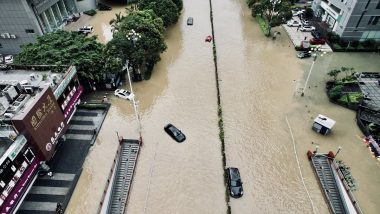Beijing, August 2: Persistent and heavy showers pounded China, with capital Beijing recording its heaviest quantum of rainfall in the last 140 years, CNN reported on Wednesday, citing local meteorologists. This comes as Typhoon Khanun has also lashed parts of Japan with wind and rain. Between Saturday and Wednesday morning, 744.8 millimetres (29 inches) of rain fell in the Chinese capital from the remnants of Typhoon Doksuri, according to the Beijing Meteorological Service – the heaviest rain over consecutive days since records began in 1883, CNN reported.
Meanwhile, Typhoon Khanun packed winds of 220 kilometres per hour (137 mph) – the equivalent of a Category 4 Atlantic hurricane – as it made its nearest pass to Japan’s southwestern Okinawa islands early Wednesday. In the past 24 hours, many locations in Okinawa have received 175 to 220 millimeters (6 to 8 inches) of rainfall, according to CNN Weather on Wednesday morning. The centre of Khanun is forecast to stall in the East China Sea in the next 48 hours, potentially making a turn toward Japan’s northern Ryukyu Islands over the weekend and avoiding a direct hit to China’s eastern coast, which has been drenched by the remnants of Doksuri. China Flood Deaths: Extreme Rain Triggered by Typhoon Doksuri Kills Two in Beijing, Forces Thousand To Flee Homes (Watch Videos).
While the slow-moving Khanun is steadily weakening, its outer bands could potentially bring heavy rainfall and high wind gusts over China’s eastern Zhejiang province and along the coast near Shanghai in the next few days. Khanun’s impact comes on the heels of Doksuri, which inundated the western outskirts of Beijing with floods that swept away cars and destroyed a bridge. Notably, at least 11 people were killed and 27 others were reported missing in Beijing, while more than 127,000 people were evacuated from the city, CNN reported citing Chinese state broadcaster CCTV. China Floods Video: 20 Dead, 27 Missing in Flash Flooding Surrounding Capital Beijing, Thousands Evacuated.
Rain Fury Wreaks Havoc in China
500m of rain fell in just 24hrs in Beijing, China triggering intense flash flooding that swept away bridges, roadways and cars.
This is the planet on 1.2ºC of fossil fuelled heating.
Do we really want to find out what comes next, or are we ready to take BOLD #ClimateActionNow? pic.twitter.com/R40iLdX8uU
— Greenpeace Canada (@GreenpeaceCA) July 31, 2023
Due to the heavy rain in many places in #China, some train lines were completely interrupted, and the train could not move forward.
The many rail lines are covered with branches.#Doksuri #flooding #storm #TyphoonDoksuri #rain #TyphoonKhanun #Beijing #洪水 #台风 #杜苏芮 #暴雨 pic.twitter.com/sltV5HHOyB
— Siraj Noorani (@sirajnoorani) August 2, 2023
Nine deaths were also reported in Hebei province that surrounds the capital, CCTV said. Rainfall in Hebei shattered records at 10 weather stations, according to state-run news agency Xinhua. On Tuesday, more than 300 people were stranded in a residential building in Hebei’s Zhuozhou city, CNN reported citing state-run outlet The Paper. More than 133,900 people in Zhuozhou City have been affected by the rainfall, according to CCTV.
Earlier, tens of thousands of people fled their homes in Beijing after Typhoon Doksuri — one of the strongest storms in years — led to torrential rain across China amid a warning of another hurricane-level storm, CNN reported. Notably, China is reeling from extreme weather events this summer, much like much of the world. Earlier, heat waves scorched Beijing, before than usual this year while records have been set worldwide for global temperatures, ocean heat and the loss of sea ice.
(This is an unedited and auto-generated story from Syndicated News feed, LatestLY Staff may not have modified or edited the content body)













 Quickly
Quickly




















